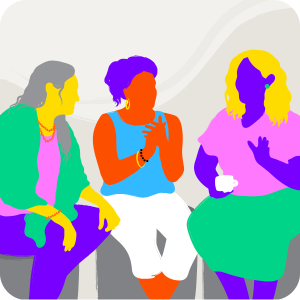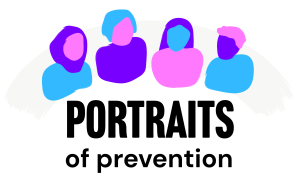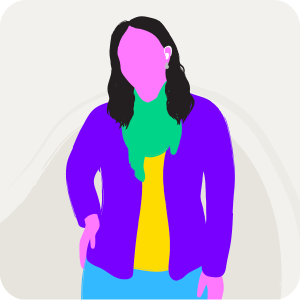
Djirra
Aboriginal-led prevention
Djirra is dedicated to early intervention and the prevention of family violence. Djirra brings a holistic approach to prevention, grounded in culture, community and connection. It is an ongoing process that runs parallel to early intervention, response and recovery work, woven through every interaction, workshop and community gathering.
Through wrap-around legal advice and representation, specialist family violence case management, and cultural and wellbeing workshops, Djirra helps to keep Aboriginal women and children safe and together. With a focus on restoring agency and dignity, fostering healing and connection and ensuring Aboriginal women feel seen, heard and uplifted, Djirra’s programs support Aboriginal women to recognise their worth, prevent further harm and interrupt cycles of family violence.
Prevention through Community Engagement
Djirra engages directly in early intervention and prevention work through their Community Engagement Service that delivers the following dedicated early intervention and prevention workshops to Aboriginal women:
- Young Luv®: This workshop supports young girls and women to understand their worth and value as Aboriginal women, to recognise red flags in the early stages of a relationship and to get support so they can avoid stepping into harmful relationships in the first place.
- Sisters Day Out®: This workshop offers a safe space for Aboriginal women to gather, connect with community, access wellbeing activities, get information about their rights and options and engage with support services. This workshop offers resources for women to navigate their personal circumstances and heal from trauma in a supportive environment.
- Dilly Bag: This is a residential on-country gathering of Aboriginal women that draws from cultural principles to inform Aboriginal women’s ways of being, so they can live a culturally safe and meaningful life.
The Community Engagement Service also supports the Koori Women’s Place (KWP), a culturally safe and welcoming physical and online space where culture is affirmed and celebrated. Aboriginal women can come into KWP to connect to each other, share stories, heal, attend workshops and access support and referrals on their own terms. Whether coming into KWP for a cuppa, a cultural workshop, to receive emergency relief or support to navigate the often-confusing service landscape, KWP is a front door that never closes.
Djirra’s Workforce Development
The Djirra team comes from diverse professional and personal backgrounds but what unites them is a connection to community and a commitment to making a difference for Aboriginal women. Some started in community development or health, others in justice or advocacy, and some found their way to Djirra through volunteer or casual roles but stayed because of the cultural connection and purpose they found within the team. Many have been part of the Djirra family for years, whether in paid or voluntary roles, driven by a passion for supporting their sisters.
For Aboriginal team members, there is a shared history, shared knowledge, shared beliefs, shared culture, shared understanding and shared respect with both each other and the women they support. For non-Aboriginal team members, entering this space requires cultural humility, respect, authenticity and a willingness to listen and learn. They must recognise their place in an Aboriginal-led space, step back when needed and approach their work with openness rather than authority.
Djirra’s community engagement team prioritise cultural knowledge, lived experience and strong relational skills over formal qualifications. Personal qualities matter most. It is important to be empathic, authentic, quick-thinking, flexible, resilient and willing to take initiative. Many of the women bring extensive experience in Aboriginal Community-Controlled Organisations (ACCOs), advocacy and facilitation. Skills such as public speaking, stakeholder engagement, event and risk management and program delivery are developed on the job. Some have also built confidence in areas like policy advocacy, change management and navigating government systems to push for better resources and recognition for their communities.
Djirra values continuous learning, but not just in the traditional, structured sense. Their approach to professional development is also experiential, based on learning from one another, attending workshops and engaging in community events.
Staff are encouraged to learn about family violence through formal training such as Safe and Equal’s Family Violence Foundational eLearn modules, but to also find their own authentic way of working with our women. What cannot be taught in a classroom is the ability to build trust and work with women authentically in a way that respects their experiences without judgement. Djirra’s teams attend ‘Lunch and Learn’ sessions with presentations by other ACCOs and referral services. Knowledge is also built through community relationships by listening, being present and understanding the lived realities of the women they support.
For non-Aboriginal team members, learning requires immersion in community, engaging with Aboriginal media, attending NAIDOC events and developing a genuine understanding of systemic racism and its impacts.
Djirra faces ongoing challenges in a sector that often does not recognise Aboriginal ways of working. Mainstream definitions of primary prevention do not align with their holistic and culturally embedded approach, and funding structures often fail to reflect the long-term, relational work they do. Through their work, Djirra team members have deepened their understanding of family violence as it impacts Aboriginal women, expanding their learning beyond mainstream definitions.They have honed their ability to facilitate group discussions, hold space for disclosures, and respond to trauma in a way that centres on Aboriginal women’s dignity and agency.
Recruiting and retaining Aboriginal staff remains a key priority, with a focus on supporting women within the organisation to grow into leadership roles. Djirra recognises that some of their staff face the same struggles as the women they support, requiring a workplace that is flexible, understanding and committed to collective care.
Djirra knows that Aboriginal women’s experiences of violence are shaped by multiple intersecting factors, including racism, disability, criminalisation and LGBTIQ+ identities. They recognise that prevention work must be inclusive and responsive to diverse experiences. Djirra is taking steps to ensure their programs are inclusive of rainbow mob and women with disabilities, adapting language and activities to be more accessible. They know that more work is needed, including through specialised roles and targeted funding.
Djirra is well-versed in responding to disclosures of family violence. They hold space for women to share their experiences on their own terms, offering practical support legal advice, family violence case management, alcohol and drug support, mental health and counselling and housing connections.
Safety planning is a crucial part of their work, ensuring that women and their children can navigate immediate risks while also building long-term security. This includes everything from emergency contacts and eSafety measures to cultural connections and support networks. They also support access to practical resources like food and toiletries where needed. The team’s approach is flexible and woman-led, ensuring each woman’s unique needs and choices are respected.
Read more portraits of prevention
Kellie
Local government
Kellie is a policy adviser and prevention practice leader at the Municipal Association of Victoria (MAV), where she oversees initiatives to enhance local government’s capacity in primary prevention.
Soizic
Preventing violence against women with disabilities
Soizic is a Lead at a state-wide Disabled People’s Organisation (DPO) that advocates for the rights, safety and respect of women and gender diverse people with disabilities.
Daniel
Masculinities and working with men and boys
Daniel is a practitioner working in a practice leadership role in a program specialising in masculinities and working with men and boys.



